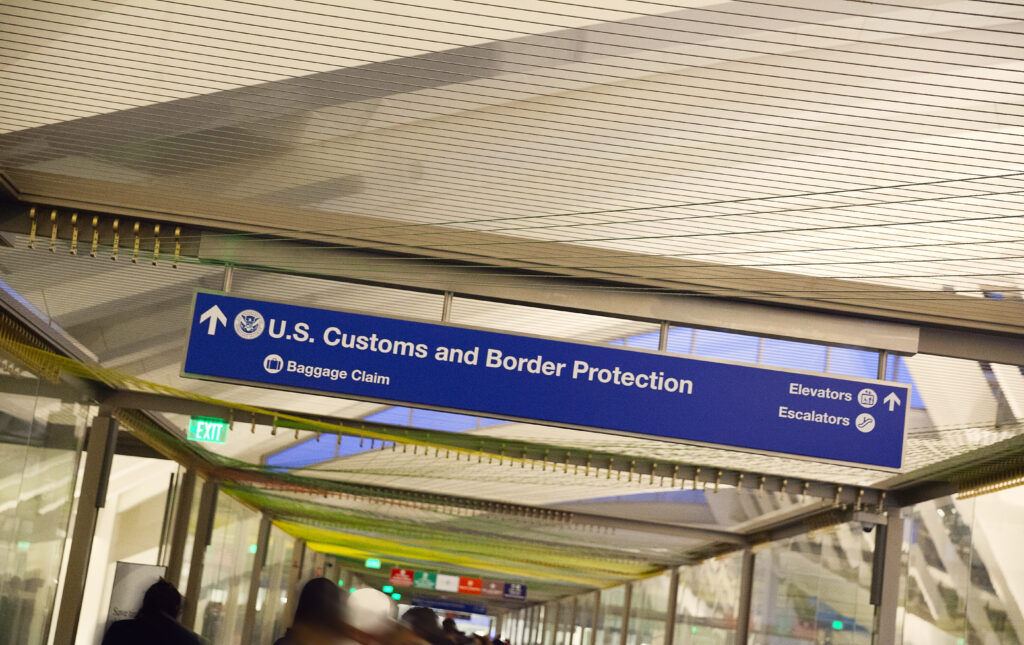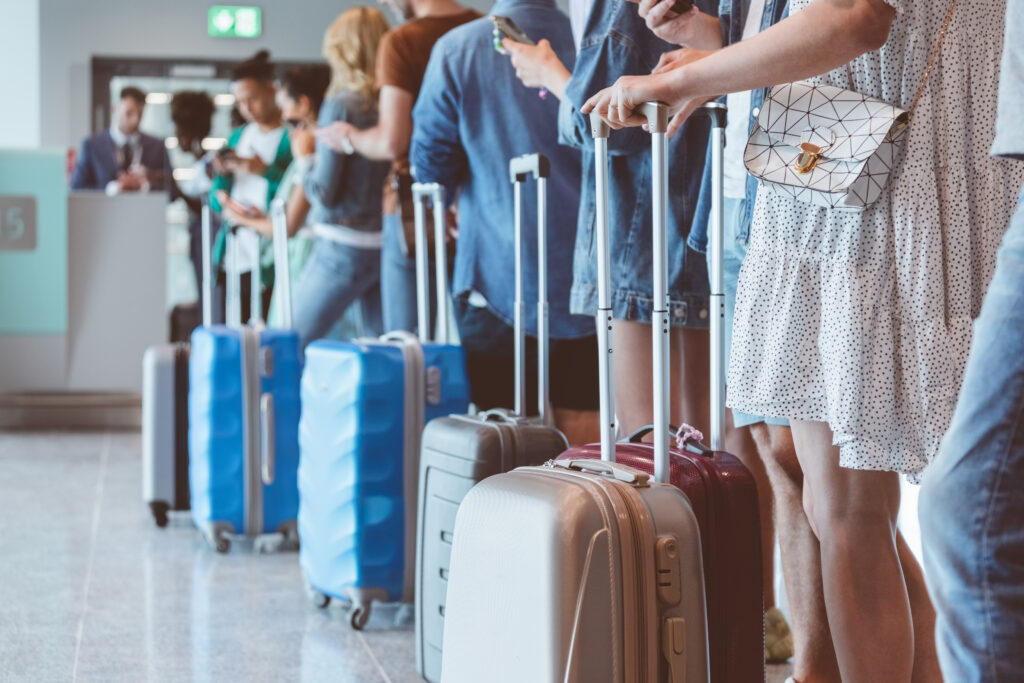CBP Agents are Checking Phones at the Border – Is It Legal? Yes
CBP Agents are Checking Phones at the Border – Is It Legal? Yes
In recent months, multiple travelers have taken to social media to report that U.S. Customs and Border Protection (CBP) agents searched their cell phones upon reentry to the United States. These reports have sparked concern and confusion about what border agents are allowed to inspect and whether such searches violate travelers’ rights. One reported case involved a French scientist who was allegedly denied entry after CBP agents reviewed messages on his phone expressing Anti-Trump political views.1 While CBP has denied conducting politically motivated searches, cases like this have raised questions about how border search authority is applied.
Many have also taken to social media describing their experience where CBP agents checked their cell phones upon entry to the U.S. A TikTok user by the name @Kevgotheat, posted a video recounting his experience when CBP agents insisted he give his cellphone for a random search after returning from his cruise trip.2 The video posted, amassing over 2 million views, describes how CBP provided him with a pamphlet detailing how they are allowed to check “anything” upon reentry to the U.S., including cell phones.3
U.S. Customs and Border Protection (CBP) has maintained that it is their responsibility to protect the U.S. “borders and enforcing numerous laws at U.S. ports of entry.”4 CBP’s website indicates that their “ability to lawfully inspect electronic devices crossing the border is integral to keeping America safe in an increasingly digital world.”5 Although CBP has patrolled the borders in U.S. airports and seaports, stories involving searches of traveler’s electronic devices were a rarity. CBP enforcement practices increased under the Trump administration following directives to enhance national security.6 Frequent international travelers from the U.S. have noticed the difference in inspection by the CBP after the President’s order when it comes to border checks.
Hilton Beckham, Assistant Commissioner of the CBP, provided a statement to The Guardian and USA Today that “any traveler” is subject to electronic inspection to identify and combat serious crimes, like “terrorism, smuggling, human trafficking, and visa fraud.”7 He goes on to state “any claims of politically motivated searches are completely unfounded.”8
CBP’s Border Search Authority
Under its border search authority, CBP may conduct electronic searches without a warrant or probable cause.9 These searches may include cell phones, laptops, tablets, and other digital devices in a traveler’s possession.10 There are two kinds of electronic searches CBP can conduct:
1. Basic Search: CBP agents manually inspect a device without connecting it to any external equipment. During this search, CBP agents can review texts, emails, photos, videos, contacts, browsing history, and documents stored locally on the device.11
2. Advanced Search: This is when CBP connects your electronic device to external equipment to copy and review data using forensic tools.12 This can include deleted files, metadata, and deeper system data. CBP conducts these kinds of searches if “there’s reasonable suspicion of a violation of law enforced or administered by CBP or a national security concern.” This would require a supervisory officer’s approval.13
It is important to note that CBP should not access cloud content unless the traveler voluntarily logs in during a search. Social media accounts can be searched if the account is public.
Know Your Rights During a Border Search

The Fourth Amendment of the U.S. Constitution protects against unreasonable searches and seizures, preserving people’s right to privacy and freedom from government intrusion.14 However, the border search exception to the Fourth Amendment allows border agents to conduct warrantless searches without probable cause.15 Border agents simply need “reasonable suspicion” to conduct an advanced search, but do not need that suspicion for a basic search of travelers’ electronic devices.
In the event CBP agents seek to search your cell phone, it is important to know what rights you have. You can refuse to provide a password or biometric unlock to your cell phone, but CBP can seize and retain the device for a forensic search or further investigation.
U.S. citizens cannot be denied re-entry to the U.S. for refusing to allow CBP to search their electronic device. This does not mean that CBP cannot choose to delay admission to the U.S. or have the device held. Lawful permanent residents (LPRs) cannot be denied entry either, but may face detention or delays at the border. If you are a visa holder however, CBP can deny your admission to the U.S. or have your visa cancelled if you refuse. It is imperative that visa holders confirm their status in the country before leaving to understand what you’re allowed to do and what you’re not allowed to do.
Although it is possible to refuse CBP’s search of your electronic devices, your ability to decline and still be able to enter the U.S. depends on your immigration status.
Preparing For International Travel

If you plan to travel out of the country soon and are worried about the cell phone checks at the border upon your return, create a plan of action to avoid any delays or detentions. Many travelers bring “travel phones” or phones that are clean with minimal data used for GPS and pictures to avoid potential issues. It is recommended to bring as few electronic devices with you on your travels to have less items to search upon your return. Deleting sensitive content, logging out of your accounts, or moving sensitive content on your device to a secure cloud storage can also help. Presently, it is common for cell phone users to enable Face or Touch ID on their phones. In the event of worry, disable Face and/or Touch ID and use a strong alphanumeric password instead.
Our experienced immigration attorneys are well-versed in your rights at the U.S. border, including how CBP may inspect your electronic devices. Whether you are a U.S. citizen, lawful permanent resident (LPR), or visa holder, our attorneys, Maggie Arias and Eduardo Pereira, can help you understand your legal protections and how to prepare before you travel internationally. If you have questions about device searches, refusal of entry, or protecting sensitive information, contact Arias and Pereira, PLLC today at (786)360-1341 for trusted legal guidance.
- See Robert Mackey, French Scientist denied US entry after phone messages critical of Trump found, THE GUARDIAN Mar. 19, 2025, https://www.theguardian.com/us-news/2025/mar/19/trump-musk-french-scientist-detained. ↩︎
- @KevGotHeat, “They made me unlock my phone and went through everything #travel #border #cruisetok #travelnightmare,” TIKTOK Mar. 11, 2025, https://www.tiktok.com/t/ZP8jWfS9S/. ↩︎
- See id. ↩︎
- U.S. Customs and Border Protection, “Border Search of Electronic Devices at Port of Entry,” last modified Apr. 11, 2025, https://www.cbp.gov/travel/cbp-search-authority/border-search-electronic-devices. ↩︎
- Id. ↩︎
- See id; see also Kathleen Wong, Yes, border control can go through your phone. Here’s what travelers should know, USA TODAY Mar. 21, 2025, https://www.usatoday.com/story/travel/news/2025/03/21/border-control-phone-search/82594653007/. ↩︎
- See Mackey, supra note 1; Wong, supra note 6. ↩︎
- See id. ↩︎
- See U.S. Customs and Border Protection, supra note 4. ↩︎
- Id. ↩︎
- Id. ↩︎
- Id. ↩︎
- Id. ↩︎
- U.S. Const. amend. IV. ↩︎
- “Under the ‘border search exception,’ federal officers may generally conduct routine, warrantless searches of persons and items entering the United States without reasonable suspicion or probable cause of unlawful activity.” U.S. Const. amend. IV, Searches Beyond the Border, LII CONSTITUTION ANNOTATED, https://www.law.cornell.edu/constitution-conan/amendment-4/searches-beyond-the-border (last visited Apr. 21, 2025). ↩︎
